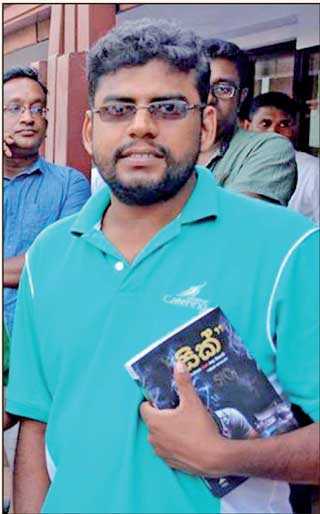Wednesday Feb 18, 2026
Wednesday Feb 18, 2026
Friday, 8 May 2020 00:00 - - {{hitsCtrl.values.hits}}
By Karl Horberg
The boundless talents of world literature were set to be recognised on 19 May with the announcement of the International Booker Prize winner. The literary award, a complement to the Booker Prize, recognises the finest translated fiction from around the world. This years’ nominees hail from Iran,
 |
While the International Booker Prize has been delayed, Sri Lanka can still use 19 May to signal to the world the importance of freedom of expression. It can start by dropping the charges against Shakthika Sathkumara and ensuring he is no longer under threat of imprisonment
|
Argentina, Germany, Mexico, Japan, and the Netherlands.
Although the announcement has been postponed due to the ongoing COVID-19 pandemic, the award is a reminder of the indispensable role fiction writers have in our society. It is through fiction that writers are able to explore fundamental truths about our existence. They construct elaborate worlds and characters to examine the human condition, allowing us to learn about perspectives we may rarely, if ever, encounter.
Salman Rushdie, a past winner of the Booker Prize, remarked at the opening of the 2015 Frankfurt Book Fair: “Literature may be weak because it has no real power in the world, but in a way it is the grandest narrative of all, in that it puts ourselves into question with fiction. We challenge ourselves and refuse to take the world as a given. We challenge all correctives of opinion, all appeasements, all fears. Literature is the unafraid form.”
In this unafraid form, authors produce works that force us to re-evaluate our own worldviews. Occasionally these works may be transgressive or controversial, pushing the boundaries beyond which we are comfortable. The right to freedom of expression protects such works and encourages them.
Regrettably, it has become common for governments to punish authors who push boundaries. Such is the case of Sri Lankan author Shakthika Sathkumara.
An award-winning author of short story collections and poetry anthologies, Sathkumara is facing imprisonment for a short story he posted on his Facebook page in February 2019. The work, entitled ‘Ardha,’ is written in a post-modern style to recount three vignettes in the life of a young ex-monk. Sathkumara uses fragmentation, dream narratives, and an unreliable narrator to touch on issues in modern Sri Lanka.
The story’s themes include homosexuality and alludes to an instance of possible sexual abuse in a Buddhist temple. It was for this reason that Buddhist monks filed a complaint against Sathkumara, alleging he was spreading religious hatred. He was briefly arrested in April 2019 and spent four months in prison.
By coincidence, the legal proceedings against Sathkumara are set to resume on 19 May. If convicted, he faces up to 12 years in prison.
It is a slight understatement to observe that Sri Lanka suffered greatly this past year. The 2019 Easter Sunday bombings resulted in the deaths of more than 250 individuals, the worst act of terrorism in more than a decade. The subsequent anti-Muslim riots resulted in more deaths and widespread property damage. It was in this climate that Sathkumara was accused of fomenting religious hatred.
It is understandable that after so many years of civil war, Sri Lanka would want to ensure its citizens are not subjected to further violence. And yet human rights and national security are not mutually exclusive. Sri Lanka can protect both its citizens and their rights. Unfortunately, in the case of Sathkumara it has failed to do so.
While the International Booker Prize has been delayed, Sri Lanka can still use 19 May to signal to the world the importance of freedom of expression. It can start by dropping the charges against Sathkumara and ensuring he is no longer under threat of imprisonment.
(The writer is Program Officer – Freedom Now, a US-based human rights organisation that defends individuals around the world from arbitrary imprisonment. One case it has worked on is that of Sri Lankan writer Shakthika Sathkumara, who faces up to 12 years in prison for a short story he published.)